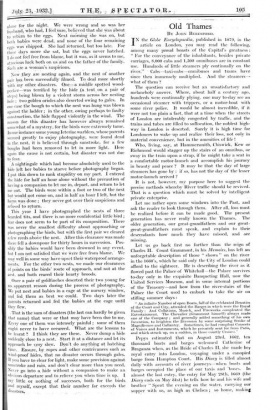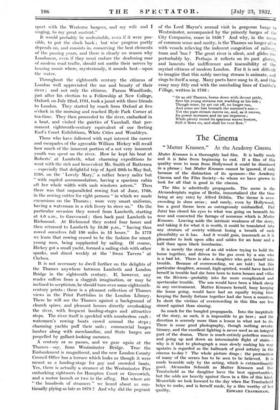Old Thames . . .
BY JOHN BERESFORD; •
IN the Globe Encyclopaedia,' published' in 1879, in the article on London, you may read the following, among many proud boasts of the Capital's greatness : "For the conveyance of the inhabitants, besides private carriages, 8,000 cabs and 1,500 omnibuses are in constant use. Hundreds of little steamers ply continually on the river." Cabs—taxi-cabs—omnibuses and trams have since then immensely multiplied. And the steamers— what of them ?
The question can receive but an unsatisfactory and melancholy answer. Where, about half a century ago, hundreds Were continually plying, one may to-day see an occasional steamer with trippers, or a motor-boat with some river police. It would be almost .incredible, if it were not too plain a fact, that at a time when the streets of London are intolerably congested by traffic, and the trains and tubes are filled to suffocation, the-noblest high- way in London is deserted. Surely it is high time for Londoners to wake 'up and realize their loss, not only in material convenience, but in the amenities of life !
Who, living, say, at Hammersmith, Chiswick, Kew or Richmond would stagger up the stairs of an omnibus, or sway in the train upon a strap, if he might take a scat in a comfortable motor-launch and accomplish his journey in beauty and peace ? It may be that the day of large steamers has gone by : if so, has not the day of the 'lesser motor-launch arrived ?
It is not, however, my purpose here to suggest the precise methods whereby River traffic should be revived. That is a question which must be solved by intelligent private enterprise.
Let me rather open some windows into. the Past, and ask the reader to look through them. After all, loss must be realized before it can be made good. The present generation has never really known the Thames. The older generation, our great-grandfathers and our great- great-grandfathers must speak, . and explain to . their descendants how much they . have missed, and are missing.
Let 'us go back first no further than the reign of Charles II. Count Grammont, in his Memoirs, has left an unforgetable description of those " shows." on the river in the 1660's, which he said only the City of London could afford to the sightseer. He is describing the river as it flowed past the Palace of Whitehall—the Palace survives today only in the exquisite Banqueting Hall, now the United Services Museum, and in some internal portions of the Treasury—and how from the river-stairs of the Palace the Court 'used to embark to take the air on stifling summer days.: .
"An infinite -Number of open Boats, full of the celebrated Beauties of the Court and City, attended the Borges in which were the Royal Family : And Collations, Musick, and Fireirorks cornpleated the Entertainment. The Chevalier (Grammont himself) always made one of the Company ; and generally added something of his own Invention, to heighten the Diversion by some surprising Stroke of Magnificence and Gallantry. Soinetimes, he had cornpleat Consorts of Voices and Instruments, which he privately sent for from Paris, and which struck up, on a sudden, in those courtly Cruizos." . . ,
Pepys estimated. that on August 23rd, 1662, ten thousand boats and barges welcomed Catherine of Bmganza when, as the Bride of Charles .II, she made her royal entry into London, voyaging under a canopied barge from Hampton Court. His Diary is filled almost daily with accounts of river. journeys—when boats and barges occupied the place of our taxis and 'buses. In almost the last entry, the entry for May 28th, 1669 (the Diary ends on May 81st) he tells how he and his wife and brother "Spent the evening on the water, carrying our supper with us,. as high as Chelsea ; so home, making sport with the Westerne bargees, and my wife and I singing, to my great content."
It would probably be undesirable, even if it were pos- sible, to put the clock back ; but wise progress partly depends on, and consists in, conserving the best elements of the passing years, and there is clearly no reason why Londoners, even if they must endure the deafening roar of modern road traffic, should not soothe their nerves by hearing music where, mysteriously, it sounds best—upon the water.
Throughout the eighteenth century the citizens of London well appreciated the use and beauty of their river ; and not only the citizens. Parson Woodforde, just after his election to a Fellowship at New College, Oxford, on July 22nd, 1761, took a jaunt with three friends to London. They started by coach from Oxford at five o'clock in the morning and reached Hyde Park Corner at tea-time. They then proceeded to the river, embarked in a boat, and visited the gaieties of Vauxhall, that per- manent eighteenth-century equivalent of our fleeting Earl's Court Exhibitions, White Cities and Wembleys.
Those who have followed with rapt interest the career and escapades of the agreeable William Hickey will recall how much of the innocent portion of a not very innocent youth was spent on the river. How he kept his boat at Roberts' at Lambeth, what charming expeditions he went with the rich and benevolent Mr. Smith of Battersea —especially that delightful trip of April 20th to May 2nd, 1768, on the 'Lovely Mary,' a rather heavy sailer but "with capital accommodation, having a spacious cabin aft her whole width with sash windows astern." Then there was that unparalleled rowing feat of June, 1768, in the rowing cutter for eight persons " in which we made excursions on the Thames ; wore very smart uniforms, having a waterman in a rich livery to steer us." On the particular occasion they rowed from Lambeth, starting at 4.0 a.m., to Gravesend ; then back past Lambeth to Richmond. At Richmond they rested four hours and then returned to Lambeth by 10.30 p.m., "having thus rowed ourselves full 130 miles in 13 hours." In 1773 we learn that rowing ceased to be the fashion for smart young men, being supplanted by sailing. Of course, Hickey got a small yacht, formed a sailing club with other sparks, and dined weekly at the 'Swan Tavern' at Chelsea.
It is not necessary to dwell further on the delights of the Thames anywhere between Lambeth and London Bridge in the eighteenth century. If, however, any reader suffers from a sluggish imagination, or may be inclined to scepticism, he should turn over some eighteenth- century prints ; there is a pleasant collection of Thames views in the Print Portfolios in the London Library. There he will see the Thames against a background of church spires, and pleasant houses directly overlooking the river, with frequent landing-stages and attractive steps. The river itself is speckled with numberless craft : watermen's rowing boats crowd around the steps ; charming yachts puff their sails ; commercial barges lumber along with merchandise, and State barges are propelled by gallant-looking oarsmen.
A century or so passes, and we gaze again at the Thames—say, from Westminster Bridge. True the Embankment is magnificent, and the new London County Council Office has a terrace which looks as though it were meant as a landing-stage for gay and crowded boats. Yes, there is actually a steamer at the Westminster Pier embarking sightseers for Hampton Court or Greenwich, and a motor launch or two in the offing. But where are "the hundreds of steamers" we heard about as con- tinually plying as late as 1879? And why did the pageant of the Lord Mayor's annual visit in gorgeous barge to Westminster, accompanied by the princely barges of the City Companies, cease in 1856? And why, in the name of common sense and sanity, is the Thames no longer alive with vessels relieving the indecent congestion of railway, tram and 'bus ? The great river is silent, and glides im_ perturbably by. Perhaps it reflects on its past glories, and laments the indifference and insensibility of the myriad citizens of modern London. For it is not difficult to imagine that this nobly moving stream is animate, and sings to itself a song. Many poets have sung to it, and this essay may fitly end with the concluding lines of Crabbe's Village, written in 1783: "Or as old Thames, borne down with decent pride, Sees his young streams run warbling at his side ; Though some, by art cut off, no longer run, And some are lost beneath the summer's sun— Yet the pure stream moves on, and, as it moves, Its power increases and its use improves ; While plenty round its spacious waves bestow, Still it flows on, and shall for ever flow."















































 Previous page
Previous page